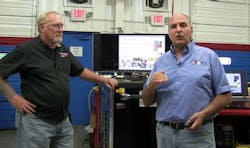And I guess the question many of us are asking is, “When will it be under control and life can return to normal?”
Or is this the NEW normal?
I was saddened to see so many premiere events having to cancel last year due to the pandemic we all faced. And, as I’m sure many of you are, I was saddened to hear that the granddaddy of all training events, VISION, was going virtual in 2021. Not that I don’t expect the event to be any less educational but I’m going to miss the interaction with techs from around the country – heck, from around the world – that makes all these events so special.
Of course, that pales in comparison to the impact it had on our nation’s economy and on the health and welfare of our fellow Americans. I’m writing this column in mid-December and the death toll to date is nearing 300,000. I can’t imagine what that number might be by the time you read this. I do hope and pray that you are taking the recommendations of the CDC seriously and following them to protect you and yours. No matter how you may feel about your chances of contracting the virus, there is no doubt that it has the potential to be dangerous, even deadly, to those who do. And I’m willing to bet that you have either experienced it firsthand or know of someone who has by now.
Even with the impact the pandemic caused, and is causing, our country, the qualities that make Americans unique in this world are the same that have allowed so many of you to adapt and even thrive. You’ve found new and innovative ways to do business and have literally kept America moving. You are the unsung and unnoticed “essential” workers our economy couldn’t survive without.
And even though the events we depended on to stay current with the rapidly changing technologies our industry is challenged by were cancelled, leaders in our business (props to training organizations like WORLDPAC and CarQuest Technical Institute – now CTI+WTI) have also adapted in order to bridge that need and make your continuing education possible. “Virtual” events and training is now an integral part of our industry’s educational opportunities and has even brought more of you into the fold by making it convenient and affordable to attend. It has also broadened the selection, allowing training departments and independent trainers alike additional platforms to reach techs here and around the world.
In addition to the enhanced reach online training can provide, existing technologies allow the experience to become ever more interactive. Gone are the days of a screen filled with some PowerPoint slide while a detached voice comments from somewhere in the background (though there are still some areas where this method is effective). Now professional trainers can incorporate live demonstrations and do so from angles that you would never be able to see in person. Kind of like watching your favorite team playing in person or on TV. If you’re stuck in the cheap seats, the players on the field are about the same size (or smaller) as the pen in your pocket. Watching the same game on TV, though, offers a variety of camera angles that put you right on the field with the advantage of rolling back the play to view it again just in case you missed something.
Of course, you don’t have to sell me on the idea. We’ve been doing online training in a shop environment for over a decade, with the help of G. Truglia and the team at TST (Technicians Service Training). We may not have the budget many of the big aftermarket training departments have, but our goals are similar – to provide you with the training resources you need to stay current, stay competitive and stay in business.
But will you have the manpower?
I come from an era where we helped our dads work on the family car and the idea of owning one of your own took hold early, as if it were part of the process of growing from boy to man. For many a young male teen then, the idea of having a “hot” car was more important than having a “hot” girlfriend. The reasoning was simple. If you had the first, you would have no trouble securing the second.
And cars back in the day were mechanical beasts that demanded attention, beyond the casual oil change. Points needed to be cleaned and set, carburetors needed cleaning and adjustment, belts needed to be inspected and tightened. It was one thing to do this on the weekends on your own ride and quite another to do it as a full-time job. The job was hard, dirty and physically demanding. Some entering the profession had the advantage of high school shop classes, but most of us learned from those we worked with on the job. Then again, the systems were not complicated to learn — especially when compared to the technologies new technicians face today.
The technology explosion that started in the late ’70s, early ’80s, was inspiring, too. I watched more than one coworker seek other career options as computers and their related technology became more prevalent. I was only energized by the changes because the new systems required you to actually think about what was happening and required you to learn in order to remain proficient.
Sound familiar?
As I entered my 40s, I began to realize that I would more than likely spend the rest of my life with a wrench in my hand. Not that that’s a bad thing. My dad always told me that a man who could work with his hands would always be able to provide for his family, and for me that had held true even in the more trying economic times. I never held dreams of being rich or owning the newest cars or the biggest home. I was satisfied with a roof over our heads, food on the table and the ability to care for my wife and children.
In my late 40s, I noticed that I wasn’t as fast as I used to be in the shop. Parts of me that didn’t ache before were now making their voices heard and I sounded like a bowl of Rice Krispies whenever I got out of bed. I began to wonder if I would be able to stay in the bay until my retirement and considered my options. Luckily, I was blessed and found my way into this side of the business and I am thankful every day for the opportunities my current role offers, not only to better myself but to help you, our readers, earn the best living you can so that you can provide for your families.
The point I want to offer here is aimed at all of you shop owners out there. Are you keeping your best people or are they bailing in search of better opportunities and bigger paychecks? Keep in mind that you are not just competing with the other automotive shops in your community, you are keeping with several technical industries from heavy duty repair to Silicon Valley who are seeking the same kind of talent you need. What are you doing to keep them?
And what are you doing to attract and develop new talent? Consider that in 2019 the median age for automotive technicians was 42.7, which means that half of the employed techs are younger, and the other half older. Even if you can easily replace the body of a retiring tech with a young gun fresh out of tech school, you are still losing that tech’s experience and hard won, real-world knowledge. Keep that in mind before you expect that newbie to perform at an A Tech level. At the same time, don’t treat him or her like we were treated when we first came up, as gofers who spent more time dumping trash and cleaning restrooms than learning how to work on cars.
I know that you, as businesspeople, have had your hands full of issues that you had to overcome to keep your doors open with the pandemic a daily concern. But at the same time, I don’t want you to lose sight of the issues you had to address prior to the “rona” either. Certainly, keeping your shop staffed with quality techs is a key factor in your continued success.
About the Author
Pete Meier
Creative Director, Technical | Vehicle Repair Group
Pete Meier is the former creative director, technical, for the Vehicle Repair Group with Endeavor Business Media. He is an ASE certified Master Technician with over 35 years of practical experience as a technician and educator, covering a wide variety of makes and models. He began writing for Motor Age as a contributor in 2006 and joined the magazine full-time as technical editor in 2010. Pete grew the Motor Age YouTube channel to more than 100,000 subscribers by delivering essential training videos for technicians at all levels.
Connect with Pete on LinkedIn.

